Immune checkpoint proteins have become an increasingly popular research subject due to the roles they play in the development of cancer. In many cases tumor cells will hijack these checkpoint pathways to protect themselves from being attacked by the immune system. For this reason, many researchers believe that disabling immune checkpoints could help the immune system fight against cancer cells.
Interestingly, anti-PD1 and anti-CTLA4 monoclonal antibodies have been shown to display anti-tumor behavior in patients. This successful research has encouraged researchers to conduct further studies into other immune checkpoint proteins, with the aim of developing improved cancer therapies.
To assist with this research ACROBiosystems has produced a range of exclusive immune checkpoint proteins; which includes His-tagged, Fc-tagged, mouse Fc-tagged, Strep-tagged, and tag free proteins.
In addition to human proteins, proteins for use in other animal models are also available; including, rat, mouse, rabbit, rhesus macaque, and cynomolgus proteins. Assays have been used to demonstrate the fantastic performance and consistency of proteins from ACROBiosystems.
Application

Key Features
High Quality
Recombinant proteins should always show consistent bioactivity and purity. All of the proteins from ACROBiosystems are tested to ensure acceptable levels of bioactivity and purity.
High Batch to Batch Consistency
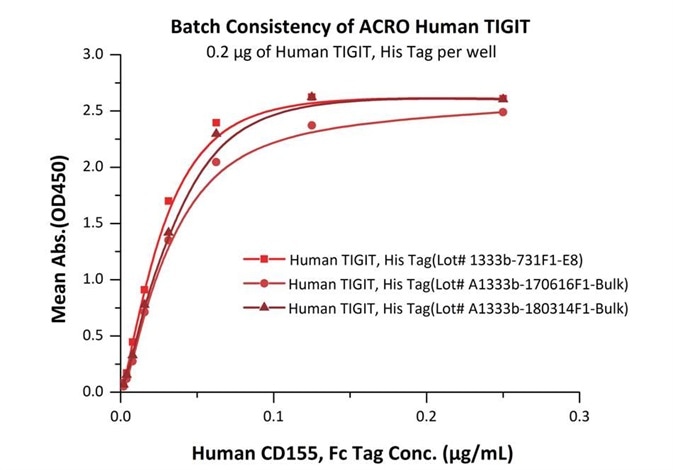
Figure 1. In the above ELISA analysis, three different lots of Human TIGIT His tag (Cat.No.TIT-H52H3) were used against Human CD155 Protein, Fc Tag (Cat.No.CD5-H5251) .The result showed that the batch variation among the tested samples is negligible.
Purity Greater than 90%by SEC-HPLC

Figure 2. The purity of ACROBiosystems Human LAG-3, Fc Tag (Cat.No.LA3-H5255) is determined to be greater than 94% (A) , while the purity of a comparable product from company R is determined to be greater than 76% (B).
Trimer proteins validated in SEC-HPLC
The superfamily for TNF (tumor necrosis factor) has 19 ligands and 29 receptors. These include, among others, TNFSF7 (CD27 Ligand), TNFSF4 (OX40 Ligand) and TNFSF5 (CD40 Ligand). TNF superfamily ligands that are endogenous tend to form trimers (Russell et al., 2018).
Bioactivity Validated in Functional ELISA, SPR and/or FACS
A series of assays, including ELISA (Figure 3, Figure 7), SPR (Figure 4, Figure 8), FACS with a binding assay (Figure 5, Figure 9) and FACS with a neutralizing assay and/or binding assay (Figure 6, Figure 10) were used to validate the bioactivity of the Immune Checkpoint Proteins.
CD47 and SIRP alpha
The interaction between SIRP alpha and CD47 (Figure 3, Figure 5) has been shown to inhibit phagocytosis (Liu et al., 2017). For this reason, using a monoclonal antibody to block this interaction (Figure 6) has been shown to increase the elimination of cancerous cells via an increase in innate immunity; thus acting as an effective cancer treatment (Huang et al., 2017).
ACROBiosystems can supply researchers with a unique range of proteins relating to CD47, which includes multiple avi tag pre-biotinylated proteins that can be used for fast, high-throughput screening. SIRP alpha and CD47 can also be supplied for use in other animal models such as rat, mouse, rabbit, rhesus macaque and cynomolgus.
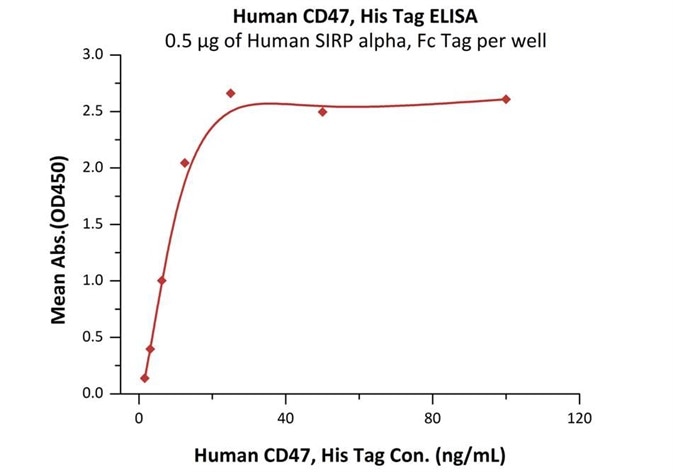
Figure 3. Immobilized Human SIRP alpha, Fc Tag (Cat.No.SIA-H5251) at 5μg/mL (100μL/well) can bind Human CD47, His Tag (Cat.No.CD7-H5227) with a linear range of 2-13 ng/mL (QC tested).
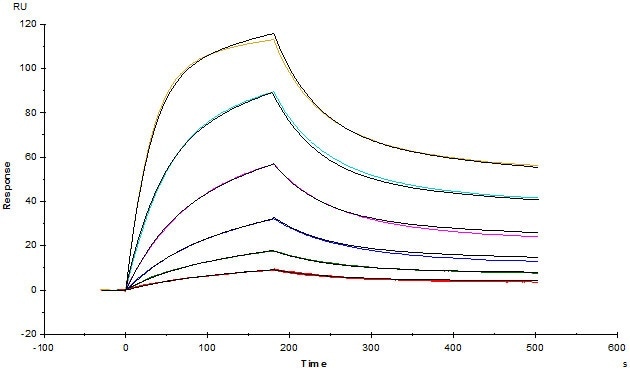
Figure 4. Anti-Human CD47 MAb (HumanIgG4) captured on CM5 chip via Anti-Human IgGFc antibodies surface, can bind Human CD47, His Tag (Cat.No.CD7-H5227) with an affinity constant of 1.66 nM as determined in a SPR assay (Biacore T200) (Routinely tested).
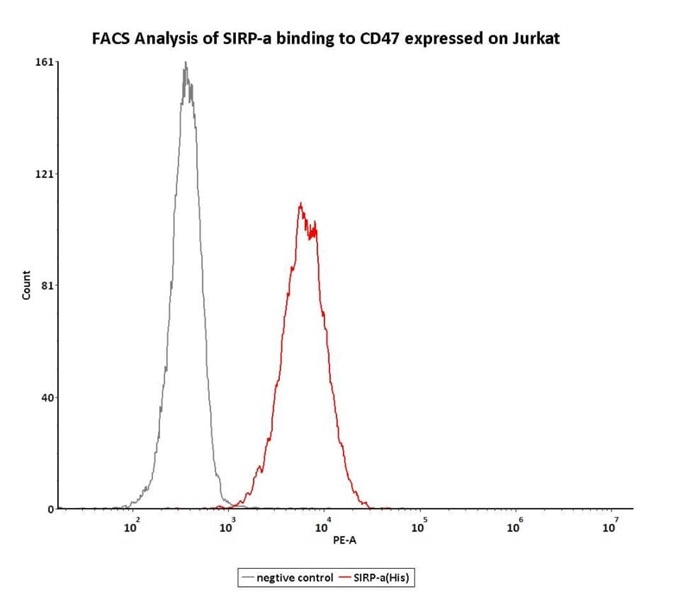
Figure 5. FACS assay shows that recombinant Human SIRP alpha, His Tag (HPLC-verified) (Cat.No.SIA-H5225) can bind to Jurkat cell expressing CD47.The concentration of SIRP alpha used is 1 ug/ml (Routinely tested).
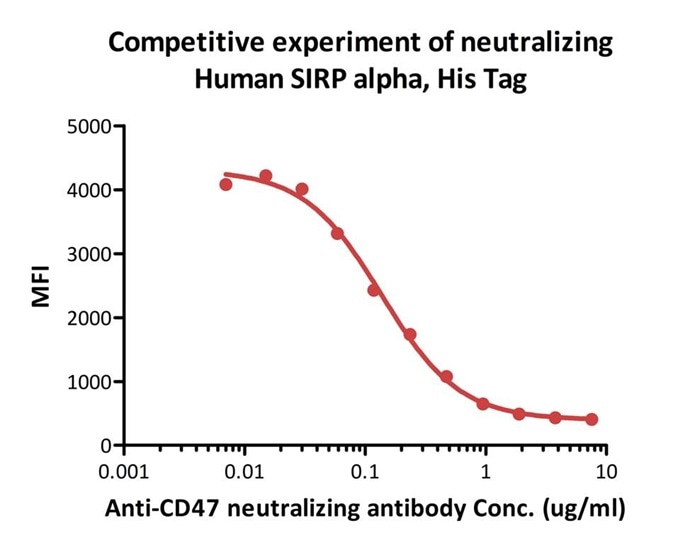
Figure 6. FACS analysis shows that the binding of Human SIRP alpha, His Tag (HPLC-verified) (Cat.No.SIA-H5225) to Jurkat expressing CD47 was inhibited by increasing concentration of neutralizing anti-CD47 antibody. The concentration of SIRP alpha used is 1 ug/ml.IC50=0.2257 ug/ml (Routinely tested).
TIGIT Signaling Axis
The interaction between CD155 and TIGIT (Figure 7, Figure 9) triggers immunosuppression in melanoma (Mahnke and Enk, 2016). For this reason, using a monoclonal antibody to block this interaction is an effective anticancer treatment via inhibition.
ACROBiosystems provides a wide range of recombinant proteins associated with TIGIT signaling; these include TIGIT, CD155, Nectin1 (CD111), Nectin2 (CD112), Nectin3 (CD113), Nectin4, CD96 and PVRIG (CD112R). In addition to the frequently used Fc, his and mouse Fc tagged proteins several other pre-biotinylated proteins are available.
TIGIT signaling proteins are also available for non-human animal models including rat, mouse, rabbit, rhesus macaque and cynomolgus.
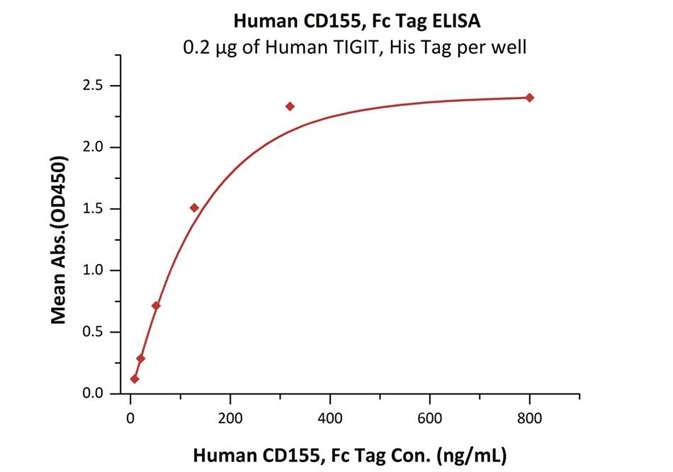
Figure 7. Immobilized Human TIGIT, His Tag (Cat.No.TIT-H52H3) at 2μg/mL (100μL/well) can bind Human CD155, Fc Tag (Cat.No.CD5-H5251) with a linear range of 8-128 ng/mL (QC tested).
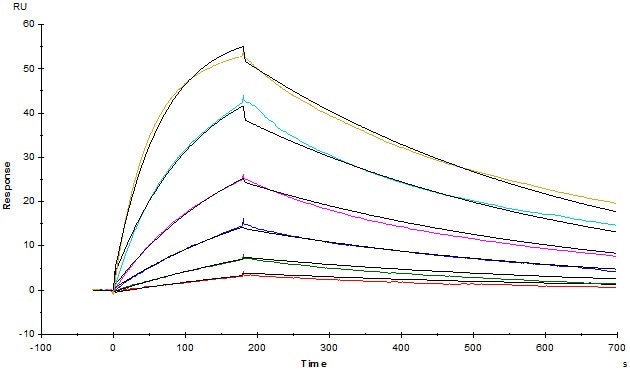
Figure 8. Anti-Human TIGIT MAb (Mouse IgG1) captured on CM5 chip via Anti-Mouse antibodies surface, can bind Human TIGIT, His Tag (Cat.No.TIT-H52H3) with an affinity constant of 3.93 nM as determined in a SPR assay (Biacore T200) (Routinely tested).
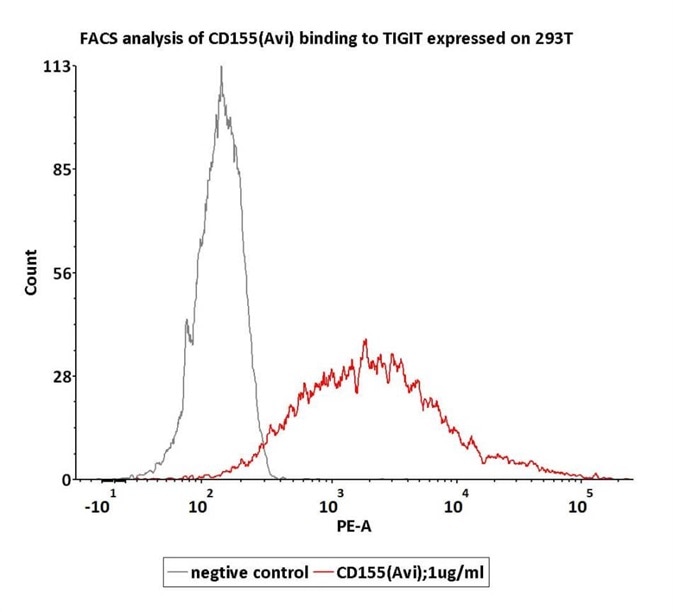
Figure 9. FACS assay shows that Biotinylated Human CD155, Fc Tag, Avi Tag (Cat.No.CD5-H82F6) can bind to 293T cell overexpressing human TIGIT.The concentration of CD155 is 1μg/ml (Routinely tested).
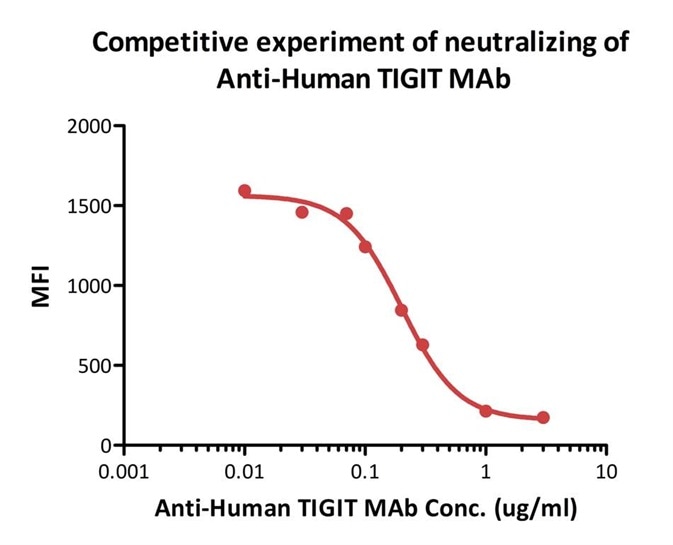
Figure 10. FACS analysis shows that the binding of Biotinylated Human CD155, Fc Tag, Avi Tag (Cat.No.CD5-H82F6) to 293T overexpressing TIGIT was inhibited by increasing concentration of neutralizing Anti-Human TIGIT MAb.The concentration of CD155 used is 1μg/ml.The IC50 is 0.201μg/ml (Routinely tested).
Biotin-labeled Immune Checkpoint Proteins
ACROBiosystems can also supply researchers with a range of biotinylated checkpoint proteins that are ready for immediate use. These highly-selective proteins provide a high signal-to-noise ratio, low variation between batches and a high bioactivity.
The use of biotinylated checkpoint proteins can simplify the assay design process and can be used for a variety of methodologies including ELISA, AlphaLISA, FACS and SPR.
Llama IgG Fc tagged Immune Checkpoint Proteins
ACROBiosystems supplies a novel set of high-purity, high-activity llama lgG Fc tagged Immune Checkpoint Proteins that are stable with a long half-life, provide enhanced target protein immunogenicity and a low tag immunogenicity, and a low level of endotoxins (0.01 EU/μg), for llama immunization.
The Next Wave of Immune Checkpoint Targets
In addition to the well-characterized immune checkpoint proteins that have been discussed so far, recent research has also found a group of novel immune regulators. These regulatory proteins could be part of the new wave of novel therapeutic targets for cancer treatment.
LILRA&B
| LILRA1 |
LILRA2 |
LILRA3 |
LILRA5 |
LILRA6 |
| LILRB1 |
LILRB2 |
LILRB3 |
LILRB4 |
LILRB5 |
LILRA&2
| LAIR-1 |
LAIR-2 |
LILRA3 |
LILRA5 |
LILRA6 |
SLAMF
| SLAMF1 |
SLAMF2 (CD48) |
SLAMF3 (CD229) |
SLAMF4 (2B4) |
SLAMF5 (CD84) |
| SLAMF5 (NTB-A) |
SLAMF7 |
SLAMF9 (CD2F-10) |
|
|
Butyrophilins
| BTN1A1 |
BTN3A1 |
BTN3A2 |
BTN3A3 |
BTNL3 |
| BTNL9 |
|
|
|
|
Inhibitor Screening Kit
ACROBiosystems also provide an inhibitor screening assay kit for PD1-PD-L1 for the fast, high-throughput screening of possible inhibiting antibodies of small molecules found in the PD1 pathway.
This assay uses a straightforward colorimetric ELISA platform, which can be used to measure the extent of binding between an in-house developed biotinylated PD-1 protein and an immobilized human PD-L1.
References
- Russell, M.S., Muralidharan, A., Larocque, L., Cao, J., Deschambault, Y., Varga, J., Thulasi Raman, S.N., and Li, X. (2018) . Identification and characterisation of the CD40-ligand of Sigmodon hispidus. PLoS ONE 13.
- Liu, X., Kwon, H., Li, Z., and Fu, Y. (2017). Is CD47 an innate immune checkpoint for tumor evasion? J Hematol Oncol 10.
- Huang, Y., Ma, Y., Gao, P., and Yao, Z. (2017). Targeting CD47:the achievements and concerns of current studies on cancer immunotherapy. J.Thorac.Dis.9, E168–E174.
- Mahnke, K., and Enk, A.H. (2016). TIGIT-CD155 Interactions in Melanoma:A Novel Co-Inhibitory Pathway with Potential for Clinical Intervention.J.Invest.Dermatol.136, 9–11.
About ACROBiosystems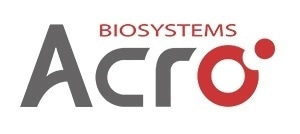
ACROBiosystems is a cornerstone enterprise of the pharmaceutical and biotechnology industries. Their mission is to help overcome challenges with innovative tools and solutions from discovery to the clinic. They supply life science tools designed to be used in discovery research and scalable to the clinical phase and beyond. By consistently adapting to new regulatory challenges and guidelines, ACROBiosystems delivers solutions, whether it comes through recombinant proteins, antibodies, assay kits, GMP-grade reagents, or custom services. ACROBiosystems empower scientists and engineers dedicated towards innovation to simplify and accelerate the development of new, better, and more affordable medicine.
Sponsored Content Policy: News-Medical.net publishes articles and related content that may be derived from sources where we have existing commercial relationships, provided such content adds value to the core editorial ethos of News-Medical.Net which is to educate and inform site visitors interested in medical research, science, medical devices and treatments.